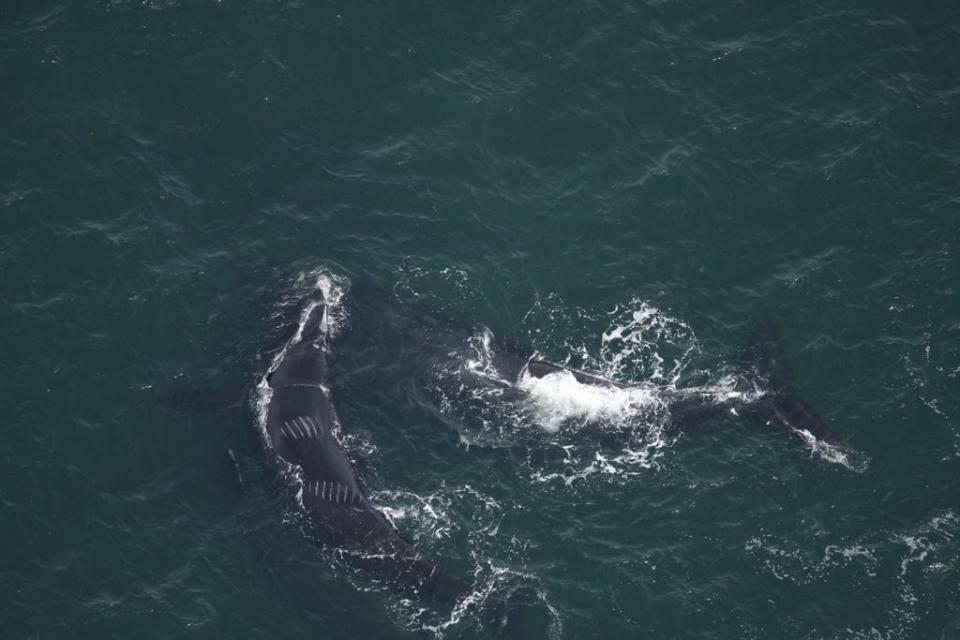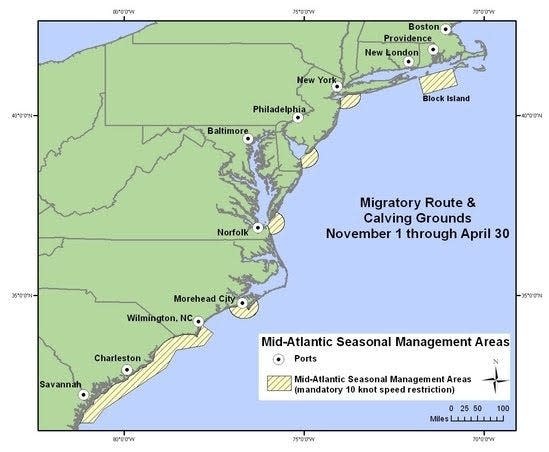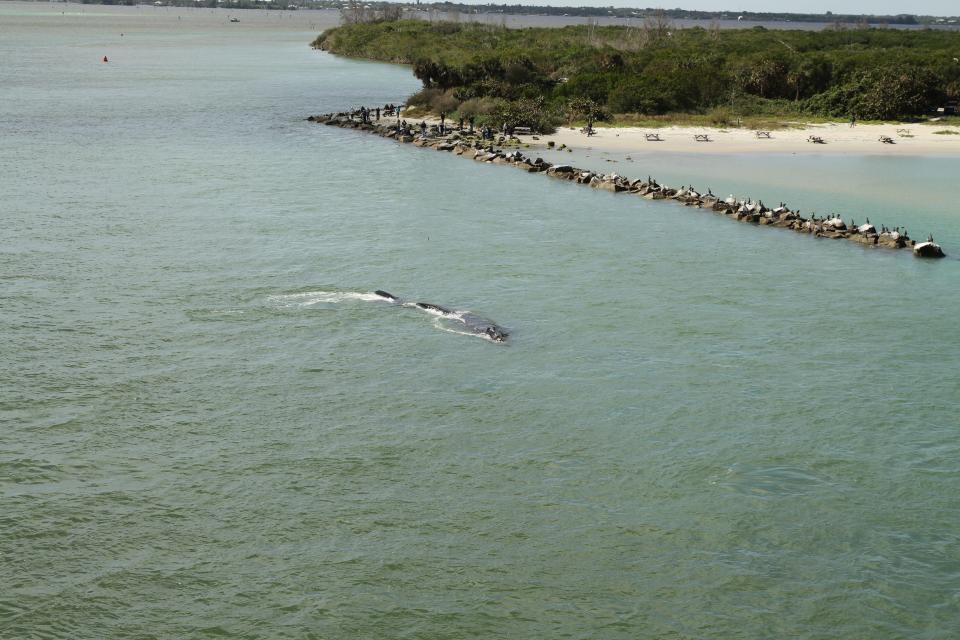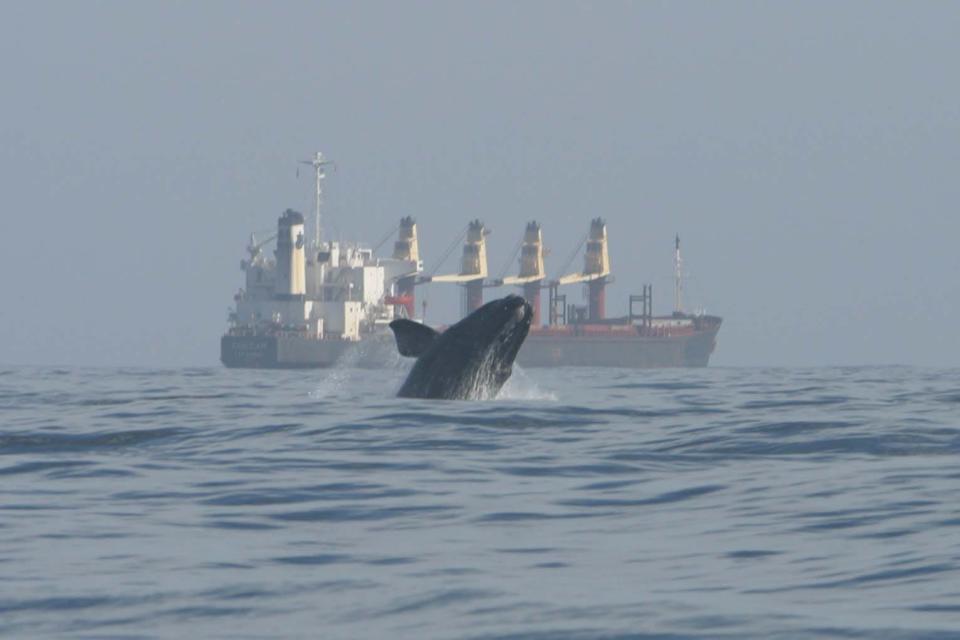Will small boats soon have to slow down off NC to protect endangered right whales?
Vessel speed limits to help avoid fatal collisions between ships and one of the most endangered animals in the world that has fallen to around 350 individuals have gone back into effect off the U.S. Southeastern coast, including parts of North Carolina.
The seasonal-management areas, or SMAs, limit the speed of most vessels 65 feet or longer to 10 knots, about 11.5 mph, in areas known to have heavy ship traffic that are also migratory routes or known calving grounds for the North Atlantic right whale. The go-slow zones, which run from November through April and have been in effect for more than a decade, extend about 20 nautical miles, or 23 miles, offshore and include areas around Morehead City and Beaufort and within 23 miles from shore between Wilmington and Brunswick, Ga.
But environmentalists say the seasonal speeding rules, which move up and down the East Coast as the whales migrate between their summer feeding grounds in New England and the Canadian Maritimes and their winter calving areas off the Southeast, aren't being followed by the vast majority of vessels. They also say more needs to be done to expand the zones, both in size and what vessels are required to follow them, to really give the right whale a fighting chance to survive.
The North Atlantic Right Whale Consortium, a group of public and private groups dedicated to the conservation and recovery of the right whale, in late October said new data showed the whale's population at 356 individuals, down from an estimated 483 animals as recently as 2010. Although hunting of the right whales, so named because they swam close to shore and floated when dead, making them easy to kill and drag ashore for processing, has been outlawed for nearly a century, vessel strikes and fishing gear entanglements remains major threats to the species' survival.
The National Oceanic and Atmospheric Administration (NOAA) agrees more needs to be done, and has proposed to put the brakes on boats as small as 35 feet in near-shore waters when the whales are known to be in those waters. Off the Tar Heel State, boaters operating in coastal waters between roughly Nags Head on the Outer Banks south through Wilmington and all the way to northern Georgia would face speed restrictions between November and mid- to late April under the expanded SMA.
But the draft rule has generated heated and vocal opposition from charter boat fishermen, local officials and even some politicians in Washington who worry the move would wreck coastal economies already struggling with increased regulations and bureaucratic red tape, natural disasters heightened by climate change, and a slowing economy.

WHALE WOES Day after baby whale found dead in NC port, entangled right whale seen off the Outer Banks
Bigger zones, including smaller boats
The original SMA rule was adopted under the pretense that strikes from larger vessels had a greater chance of killing or injuring a right whale. But recent incidents show boats of any size can severely hurt or kill the animals, including a 2021 case when a 54-foot charter sportfishing yacht heading back to St. Augustine, Fla., struck and killed a juvenile right whale. The boat eventually sank.
According to federal data, 12 of 36 documented right whale deaths between 2017 and 2023 were due to vessel strikes. That was the most deadly known cause.
With the whale's numbers decreasing despite rules like the SMAs to protect them, NOAA Fisheries declared an “Unusual Mortality Event” in right whales in 2017. That designation allows the agency to further jointly study and reduce whale deaths with other organizations. Several environmental groups also ramped up the pressure on NOAA by suing the agency.

The result was the proposal to expand the SMAs in size and scope.
Gib Brogan is campaign director for the marine environmental group Oceana.
"The protections that are now in place are not being followed, and that’s putting the whales at risk,” he said.
A study by Oceana looking at boat speeds from November 2020 through July 2022 found that 85% of vessels sped through the mandatory slow zone running from Wilmington to north Georgia. The average was 84% for SMAs in general. The numbers were much the same for speeding vessels in voluntary slow zones, where NOAA alerts boats outside of SMAs if right whales are spotted or detected with acoustics. There, Oceana found 82% of boats sped.
UNCHARTED WATERS For highly endangered North Atlantic right whales, offshore wind brings a lot of unknowns

Brogan said increased enforcement and stronger safeguards are needed to help the whales, especially since climate change and other factors have altered the whales' habits and behavior since the SMAs were originally established in 2008.
But he said the rules also have to be expanded to include smaller boats if they are to be truly effective.
“If we're going to support the recovery of this species, fewer than 1% a year can die from human causes, whether vessel strikes or fishing gear entanglements," Brogan said. "That’s a really high bar, but we know from other endangered marine mammals and other species that if we provide for them they will come back.”
Coastal economies at risk
But fishermen and others worry at what cost to coastal communities.
Charter boat and fishing captains fear the proposals could decimate their business. Although not the height of the summer tourism season along the North Carolina coast, the spring and fall "shoulder" seasons still generate plenty of business from visiting fishermen for area boat captains, hotels, tackle shops and restaurants.
According to a report by the American Sportfishing Association released in May 2022, the recreational fishing industry in North Carolina supports 455,000 jobs and generates $152 in economic impact for every pound of fish landed.
Since NOAA first floated the rules in summer 2022, opposition from politicians to the government's proposal has mushroomed. Recently five state attorney generals, including Georgia and South Carolina, sent a letter to NOAA expressing concerns about impacts from the proposed regulations to their vital fishing and recreational boating industries and coastal economies.
U.S. Rep. David Rouzer, who represents Southeastern N.C. in Congress, also has expressed his opposition to the new rules.

All in all, NOAA officials said they've received more than 90,000 public comments on the proposed rule change.
Brogan said he understands the concerns from coastal officials and residents, but the right whale is running out of time.
"This is what we need to do to protect the species if we want it to come back," he said. "This is an absolutely vital part of their potential recovery."
Katie Wagner, a spokesperson with NOAA Fisheries, said the agency "anticipates taking final action on the proposed rule to modify North Atlantic right whale vessel speed regulations in 2023."

Reporter Gareth McGrath can be reached at GMcGrath@Gannett.com or @GarethMcGrathSN on Twitter. This story was produced with financial support from 1Earth Fund and the Prentice Foundation. The USA TODAY Network maintains full editorial control of the work.
This article originally appeared on Wilmington StarNews: NOAA mulls small boat speed limit off NC to protect endangered whales

